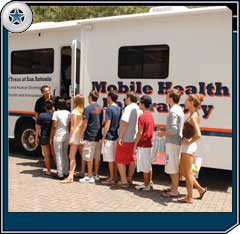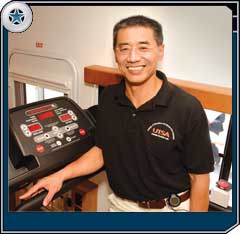The University of Texas at San Antonio

|
|
Dr. Zenong Yin greets students who are touring the Mobile Health Laboratory.
|
While the study focused on middle-aged women looking to improve their health, it is two young girls who stay on the minds of the researchers�not because of the children's ages or resistance to change, but because of their eventual transformation.
The sisters, ages 9 and 11 and both overweight, became "poster children" for Dr. Zenong Yin's passion for healthy living.
Chair of the Department of Health and Kinesiology at The University of Texas at San Antonio, Dr. Yin holds the Loretta J. Lowak Clarke Distinguished Professorship in Health and Kinesiology and has used funds distributed from the endowment to pass on that passion to others.
"The endowment has supported the research I was already involved in and has allowed me to start a variety of new pilot projects," says a grateful Dr. Yin.
One such project was MiCasa, a 16-week research program established by Dr. Yin in partnership with the Edgewood Family Network on San Antonio's West Side. The program targeted nutrition, physical activities and food management for medically underserved Mexican-American women at risk for diabetes and other health problems.

|
|
Dr. Zenong Yin in the Mobile Health Laboratory.
|
The young girls' mother enrolled in the program, taking her unwilling daughters to the biweekly meetings and nutrition classes. Fruits and vegetables began to dominate their diet. Turkey replaced ground beef, and vegetable chips took the place of the greasy, fried variety. Free pedometers were given to each participant to record every step. As a result, "there was a noticeable (decrease) in weight in the girls," said Mary Gentry and Desiree Acosta, graduate assistants who work with Dr. Yin. "When you would say, 'My goodness, you look so good,' you'd get these big smiles from the girls."
The heart of MiCasa is research, and an important part of that research is the UTSA Mobile Health Laboratory, a state-of-the-art $285,000 rolling health research and promotion facility established by Dr. Yin to promote healthy living in low-income communities in South Texas and beyond. The specially equipped motor home contains a scanner with dual energy X-ray absorptiometry described by Dr. Yin as the latest technology for assessing body composition. It also has a blood drawing station, machines to assess cardiovascular functions, multimedia stations for health education, and a mini kitchen for cooking demonstrations and food preparation classes. The Mobile Health Lab is manned by student volunteers, faculty and staff from Dr. Yin's department. The team has used the lab in numerous health events to give vital information to participants, prompting many like those in the MiCasa project to improve their health.
With more projects in the pipeline, Dr. Yin credits the Loretta J. Lowak Clarke Distinguished Professorship in Health and Kinesiology with helping him share his passion for healthy living through his teaching and research at UTSA. As for the young sisters, they are passing on Dr. Yin's passion by teaching their friends what they've learned.
The Loretta J. Lowak Clarke Distinguished Professorship in Health and Kinesiology and the Robert E. Clarke, Jr. Distinguished Professorship in Electrical Engineering, both created in 2005 at UTSA by a generous gift from alumni Jeff and Dr. Loretta Clarke of Austin, are invested in the Long Term Fund.